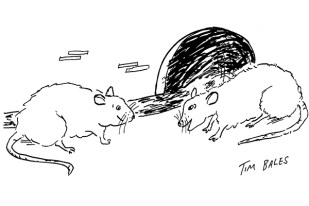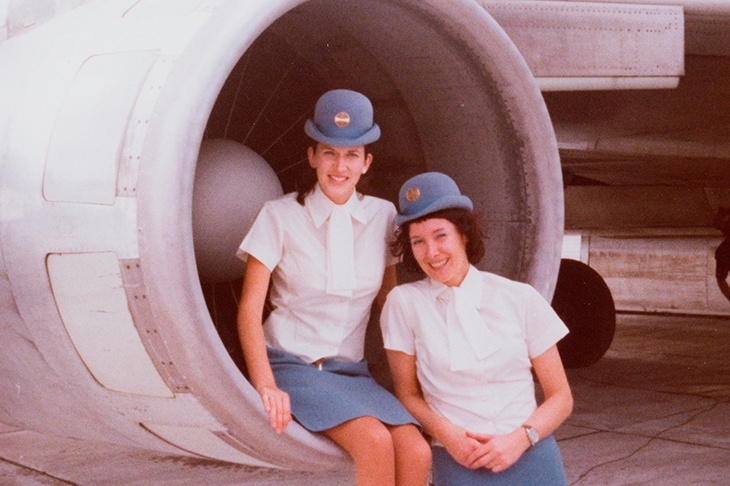Come Fly the World is not the book I thought I was getting. The slightly (surely deliberately) pulpy cover — a glamazonian stewardess, her mirrored cat-eye sunglasses reflecting a runway — promised a Mad Men-era history of silver service and highballs at 30,000 feet, glamour, frocks and sexual shenanigans.
Admittedly, deprived of the quixotic delights of a Ryanair snack pack shared with a fractious toddler on a delayed 5 a.m. flight to Alicante at the moment, I ignored the subtitle: ‘The Women of Pan Am at War and Peace.’ That sets the tone more accurately. This is a fairly serious-minded social and geopolitical history of Pan Am, 1966-1975, which takes in the Vietnam war, African independence struggles and the civil rights movement, plus huge upheavals in sexual politics. It’s an undeniably juicy period of societal change and questioning, and the author Julia Cooke uses individual stewardesses’ experiences as the prism through which to examine it.

We follow three more or less regularly: Lynne wants a complete change from her male-dominated biology degree, Karen is constitutionally adventurous and the Norwegian Tori’s thwarted dream to become a diplomat leads her to another outlet for world travel. Two others, Hazel and Clare, feature occasionally. These ‘stews’ and their colleagues fly the world, maintaining fragrant, smiling professionalism in the face of global events: hijackings and armed insurrection, near misses and hair-raising evacuations. They are the faces of President Ford’s Operation Babylift, caring for hundreds of Vietnamese ‘orphans’ (some later revealed to be nothing of the sort).
On a personal level, Pan Am is a means to an end, and the end is freedom. Without labouring the point, Cooke is good on the way an industry with rigid, deep-rooted notions about female service, looks and behaviour became a ticket to unparalleled independence. The weight checks, age limits and hair and make-up strictures are already well-documented, but the book features other jaw-dropping examples of corporate sexism. At one point in the 1960s, Branff air hostesses had to incorporate two outfit changes during a flight, ending up ‘in leopard-print leotards with a sheer overlay’; National Airlines ran an ad featuring a picture of a pretty stewardess captioned ‘I’m Cheryl, Fly Me’, and the Pan Am supervisors’ notes on interview candidates Cooke quotes are brutal: ‘Needs to have teeth fixed’; ‘Dumpy — head small for body… Theatrical, too much eyebrow.’
The Pan Am ‘stews’ faced hijackings, armed insurrection, near misses and hair-raising evacuations
It’s enjoyable reading how a sclerotic sector came up against the sharp end of 1960s’ and 1970s’ campaigning and activism, flailing, and failing, to defend lawsuits against bans on married staff, male stewards and spectacle-wearing. But it’s even more pleasurable discovering how adventurous the stewardesses were, even within the Maidenform girdle of the worst chauvinist attitudes. I loved the sections about them exploring a world of Nairobi nightclubs, Liberian beaches and taxis to the Taj Mahal. Cooke conjures a gorgeous image of Lynne alone in the Beirut InterContinental, eating yoghurt on her balcony and enjoying the ballet of uniformed staff pouring coffee from long-spouted pots in the lobby. Hazel, a black stewardess about whose experiences I would have liked to read more, falls in love with Moscow, standing in line to buy lipstick with the locals and sneaking into circus auditions (‘tigers roaring, bears juggling’). Karen drives herself to buy dried octopus in Guam and spends afternoons reading by the pool in Bangkok with her hotel’s pet gibbon.
As a piece of storytelling, it is not without pockets of turbulence (sorry). It might be constructed around three stewardesses, but this is not Three Women, Lisa Taddeo’s frank exploration of female desire, which it occasionally seems to want to be. In fact, it’s surprisingly buttoned-up about an era of dizzying sexual liberation and an industry notorious for intense sexual harassment: of course, you can only be as candid as your interviewees will allow.
Equally, the merging of personal and political is not always seamless. The history sections are densely informative, sometimes to a fault, while descriptive flourishes in the personal threads can feel oddly dated (Karen ‘had never been so tanned, never so comfortable with salt on her skin’; Tori has ‘blue eyes, broad cheekbones, a smile that hijacked her whole face’). But when the two parts do complement each other, the book soars. That happens in the poignant accounts of women looking after fresh-faced GIs headed to Vietnam in the full knowledge of what awaits them; and memorably in a brief, lovely section on the moon landings (a plane full of marines sings patriotic songs as they find out, in flight, that Neil Armstrong has touched down).
Come Fly the World has a very different resonance now than it would have had in 2015 when Cooke conducted her first stewardess interviews. ‘If only,’ I whisper, imagining this summer’s nine-hour drive to spend three midge-tormented nights opposite Oban ferry terminal. At a time when that 1960s notion of air travel as decadent and exceptional is experiencing an unexpected revival, this book may not be quite the full Pan Am dry martini you crave, but it could be the G&T in a plastic glass you need.






Comments